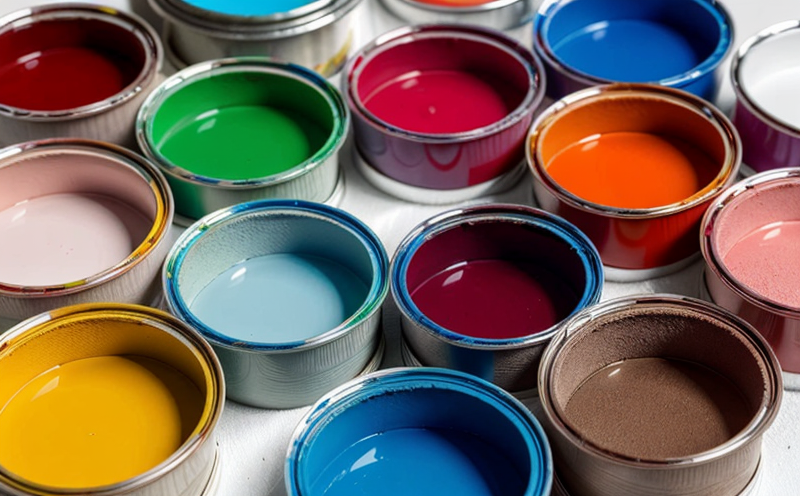CPSIA Heavy Metal Content in Paint Testing
The Consumer Product Safety Improvement Act (CPSIA) of 2008 introduced stringent regulations aimed at ensuring the safety and health of children’s products, including toys. One critical aspect is the limit on heavy metals in paints used for toy manufacturing. This testing ensures that toys do not contain harmful levels of lead, mercury, cadmium, or other toxic substances.
The CPSIA sets specific limits on the concentration of certain heavy metals in paint as follows:
- Lead: 90 parts per million (ppm) for children’s products
- Cadmium: 100 ppm for children’s products
- Mercury: 65 ppm for all products
- Cobalt, chromium, and nickel: No specific limit but must be considered in composite limits.
These regulations are designed to protect public health by preventing the ingestion of hazardous materials. Toy manufacturers must ensure compliance with these standards to avoid legal issues and maintain their reputation for safety and quality.
The testing process involves several key steps:
- Sample Collection: The paint samples are collected from various toys that are intended for children under 12 years old. Samples must be representative of the product’s surface area.
- Preparation: The paint samples undergo thorough cleaning and preparation to ensure accurate testing results. This includes removing any dust, debris, or other contaminants.
- Instrumentation: Instruments such as Inductively Coupled Plasma Mass Spectrometry (ICP-MS) are used to measure the concentration of heavy metals in the paint samples.
- Data Analysis: The data obtained from the instrumentation is analyzed to determine if the concentrations fall within acceptable limits set by CPSIA. Any deviations must be reported and addressed immediately.
The testing process requires precision and expertise to ensure accurate results. Eurolab’s team of experts uses advanced techniques and state-of-the-art equipment to provide reliable test results. Our laboratories are equipped with the latest technology, including ICP-MS, XRF spectrometers, and other analytical instruments necessary for this type of testing.
Compliance with CPSIA is essential for toy manufacturers to avoid legal penalties and maintain their reputation. By partnering with Eurolab, you can ensure that your products meet all regulatory requirements and are safe for children to use.
Eurolab Advantages
At Eurolab, we understand the importance of CPSIA compliance in toy manufacturing. Our advantages include:
- Expertise and Experience: Our team has extensive experience in CPSIA testing, ensuring that your products meet all regulatory requirements.
- Advanced Equipment: We use state-of-the-art instrumentation such as ICP-MS to provide accurate results.
- Comprehensive Testing Services: In addition to heavy metal content testing, we offer a wide range of other testing services for toys and children’s products.
- Fast Turnaround Times: We pride ourselves on providing quick turnaround times for our testing services, ensuring that you can meet your deadlines.
- Cost-Effective Solutions: Our pricing is competitive, and we offer a range of packages to suit your budget.
- Confidentiality: We take the utmost care to ensure the confidentiality of your data and results.
Partnering with Eurolab means working with a trusted partner who understands the complexities of CPSIA compliance. Our services are designed to help you stay ahead of regulatory changes and ensure that your products meet all safety standards.
Quality and Reliability Assurance
Eurolab is committed to providing high-quality, reliable testing services. We adhere strictly to international standards such as ISO/IEC 17025 for our laboratories and have implemented robust quality control measures. Our testing processes are designed to be repeatable and reproducible, ensuring consistent results.
- ISO/IEC 17025 Compliance: Our laboratories are certified to ISO/IEC 17025, the international standard for the competence of calibration and testing laboratories. This ensures that our tests meet the highest standards of accuracy and precision.
- Regular Calibration: All instruments used in our testing process undergo regular calibration to ensure their accuracy.
- Internal Audits: We conduct internal audits regularly to identify areas for improvement and maintain high-quality standards.
- Continuous Training: Our staff receive ongoing training to stay current with the latest testing methods and technologies.
We are committed to providing you with reliable test results that you can trust. By partnering with Eurolab, you can be confident that your products meet all regulatory requirements and are safe for children to use.
International Acceptance and Recognition
Eurolab’s testing services are widely recognized and accepted by regulatory bodies worldwide. Our certifications and accreditations include:
- CNAS (China National Accreditation Service for Conformity Assessment): Eurolab is accredited by CNAS, which is the national accreditation body of China.
- IAPCB (International Association of Product Compliance Bodies): Our services are recognized by IAPCB, a global organization that promotes product safety and compliance.
- AOCL (Australian Occupational & Environmental Hygiene Certification Ltd.): Eurolab is certified by AOCL, ensuring our services meet Australian standards.
- CAMS (Canadian Association for Metric Standards): Our testing processes are aligned with Canadian regulatory requirements.
By partnering with Eurolab, you can ensure that your products meet the highest safety and compliance standards. Our global recognition means that your products will be accepted by regulatory bodies in multiple countries.





